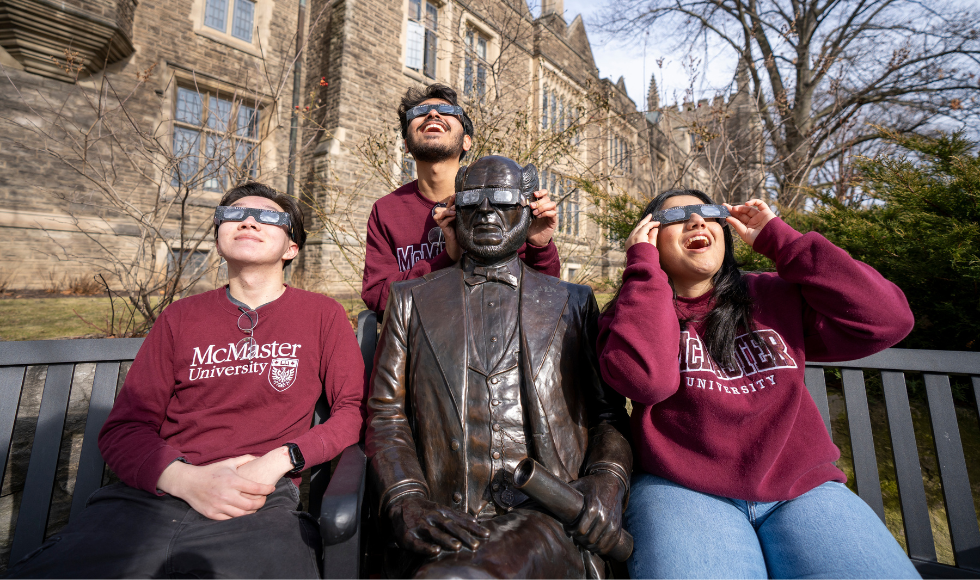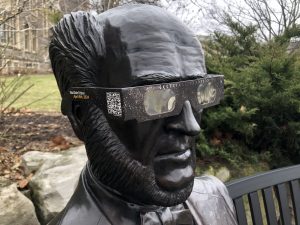McMaster to host eclipse viewing party on April 8

Free glasses, outreach events and an Instagram-worthy eclipse viewing party are being planned to mark the total solar eclipse on April 8th. (Photo by Georgia Kirkos/McMaster University).
Please note: As of April 3, all campus locations have run out of eclipse glasses.
It’s a once-in-a-lifetime event that’ll have you looking up from your phone for at least a couple hours on Monday, April 8.
McMaster and Hamilton will be among the few places in North America to experience a total solar eclipse. The eclipse will start at 2:03 p.m. and end by 4:30 p.m. The Moon will completely block the Sun for 96 seconds starting at 3:18 p.m., turning mid-afternoon into midnight and filling the sky with stars.
This’ll be the first total solar eclipse over McMaster since Jan. 24, 1925. The next won’t happen until Oct. 26, 2144.
“Having a solar eclipse come to you is such an infrequent event,” says assistant professor Robert Cockcroft, who’s also the director of the William J. McCallion Planetarium.
“Even with all of today’s technology and the fast pace of modern life, we’re still subject to what’s happening in the sky. An eclipse is an amazing reminder for us all.
We’ll be talking about this for a long time after the eclipse. This will be one of those ‘where were you when’ moments.”
Students and faculty in the Department of Physics & Astronomy are also hosting a series of eclipse talks on campus and in the community, including at Six Nations and Oshweken.
“I’m pleased that McMaster is using this unique celestial event to take science to local and Indigenous communities,” says Susan Tighe, provost and vice-president (Academic). I’m thankful to the faculty members and students who are volunteering their expertise and time.”
FREE GLASSES
You’ll need special glasses to safely look at the eclipse.
Certified eclipse glasses are available free-of-charge for all students, faculty, staff and community partners, courtesy of the Office of the Provost and the Faculty of Science.

Glasses are currently in stock at the Dean’s Office in the Faculty of Science (room 102 in the Burke Science Building) and in the Office of the Provost in University Hall (room 201).
Glasses will be available at all campus libraries starting on Feb. 26.
Glasses will also be available at Hamilton, Halton and Norfolk libraries on Feb. 22 and at Burlington and Six Nations libraries on March 4.
Group orders can be made while supplies last by visiting the Faculty of Science’s W. J. McCallion Planetarium website.
OUTREACH EVENTS
A series of eclipse talks hosted by McMaster students and faculty members are planned They will be held on campus and in the community.
McMaster is also providing viewing glasses, programming and information to various school boards, libraries and community organizations. A free Alumni Family Event was held Sunday, Feb. 18 at the David Braley Health Sciences Centre.
Free public lectures at McMaster are scheduled for March 12, 18, 22, 26 and April 2.
Eclipse shows at the Planetarium will be held during March Break (March 11 to March 15) and on April 3. Register in advance on the planetarium website.
Student eclipse ambassadors can also be booked to deliver community talks.
Full details and updates on all outreach events are posted at the W. J. McCallion Planetarium website.
VIEWING PARTY
All students, faculty, staff, alumni and families are invited to join the W. J. McCallion Planetarium and the Department of Physics & Astronomy for an Instagram-worthy eclipse viewing party on April 8 at the Ron Joyce Stadium.
The afternoon event will feature food trucks, entertainment, McMaster physics and astronomy experts and a once-in-our-lifetime celestial event. Free eclipse glasses will also be available at the stadium.
While the event’s free, you’ll need to register in advance at the planetarium website beginning on Feb. 26.
It’s anticipated that the stadium will be at capacity so order tickets early.
Learn more about how McMaster and the Department of Physics and Astronomy are marking the total solar eclipse here.


